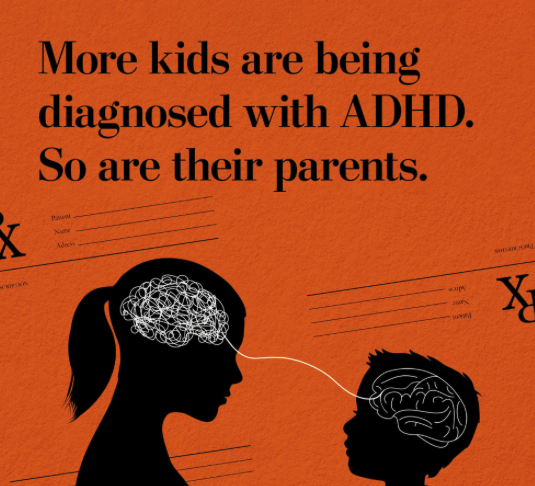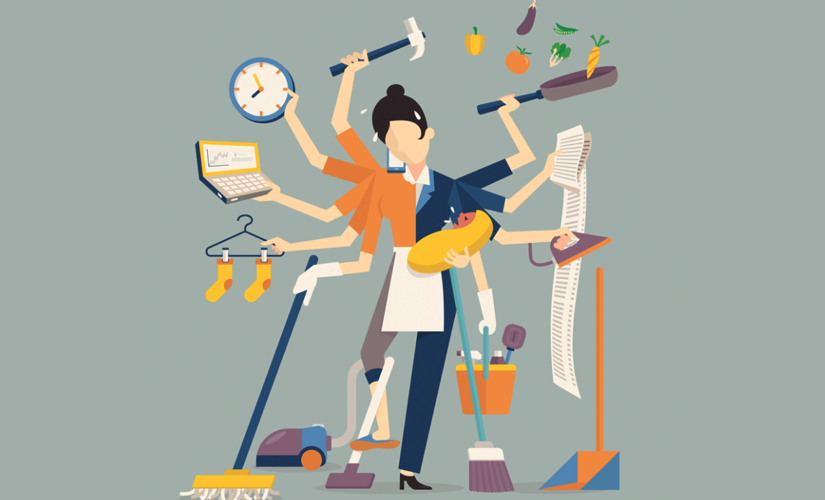Parenthood is a dynamic journey filled with love, joy, chaos, and complete sensory overwhelm! For parents living with Attention Deficit Hyperactivity Disorder (ADHD), the daily challenges can be uniquely demanding. In this blog post, we’ll explore how ADHD affects parents and provide insights into coping strategies and self-care.

ADHD in Parents:
- Juggling Multiple Responsibilities: Parents with ADHD often find themselves exhausted and emotionally reactive when juggling numerous responsibilities, from managing household chores to overseeing children’s activities. The constant need to multitask and task switch can be overwhelming, leading to stress and exhaustion.
- Time Management Struggles: Individuals with ADHD commonly face difficulties in time management and organization. For parents, this can translate into missed appointments, forgotten commitments, and a perpetual feeling of being behind schedule.
- Parenting Challenges: Consistent and intentional parenting, even for those without ADHD, can be challenging. Parents with ADHD may find it harder to maintain consistent discipline, follow routines, or stay focused during important parenting moments.
- Sensory Overwhelm: Sensory overwhelm occurs when an individual’s nervous system receives more sensory input than it can effectively process, leading to feelings of stress, anxiety, and discomfort. This state makes it difficult to filter and prioritize information. For parents, this can lead to constant feelings of overstimulation, irritability, and a desire to escape.

Coping Strategies:
Distractions & Sensory Overwhelm
Managing distractions and sensory overload is a significant challenge for individuals with ADHD. It impacts their ability to focus, concentrate, and stay on task with everyday activities. External stimuli, such as noise, visual clutter, and digital distractions, can easily derail attention and disrupt workflow, leading to decreased productivity and increased frustration.
To minimize distractions and sensory overwhelm, individuals with ADHD can implement practical strategies, such as creating a designated workspace free from clutter and external disturbances. Utilizing noise-cancelling headphones or Loop Earplugs, listening to music, or listening to white/brown noise can help block out distractions and create a more conducive environment for concentration. Additionally, implementing time-blocking techniques and setting clear boundaries around work and leisure activities can help maintain focus and productivity throughout the day.
Getting Things Done
Executive function deficits, such as poor time management, organization, and task initiation, are hallmark symptoms of ADHD that can significantly impact daily productivity and task completion. Individuals with ADHD often struggle with planning, prioritizing, and following through on tasks, leading to feelings of overwhelm and procrastination.
To improve productivity and task management, individuals with ADHD can benefit from breaking tasks down into smaller, more manageable steps and utilizing task lists or visual aids to stay organized and focused. Implementing time-management techniques, such as the Pomodoro Technique or time-blocking, can help structure work periods and breaks, enhancing productivity and minimizing distractions. Additionally, incorporating external cues and accountability measures, such as body doubling and setting deadlines, can provide motivation and support for task completion. Alarms and timers are also great tools to keep track of time, though the sound should be changed frequently. Companies like Cave Day and Flow Club create intentional workspaces designed to drop you into a productive flow. When thinking about productivity, try planning tasks around transition. It is easier to start something if it feels connected to another task that is ending.
Remember, something is better than nothing! It’s better to do a small part of every task rather than procrastinate. Additionally, learning your bandwidth is essential. It’s ok to say no to work or social invitations that may cause you stress and excess pressure. With practice, implementing and sticking to set boundaries becomes easier.
Sleep
Sleep disturbances are a prevalent concern among individuals with ADHD, characterized by difficulty falling asleep, frequent awakenings, and restless sleep patterns. Racing thoughts and hyperactivity can make it challenging to unwind and relax, leading to prolonged periods of wakefulness. Additionally, impulsivity and poor time management may result in irregular sleep schedules and inconsistent bedtime routines. Adding in wake ups from young kids makes it all that much more challenging.
To improve sleep quality and promote better restorative sleep, individuals with ADHD can implement various strategies, such as creating a calming bedtime routine, minimizing screen time before bed, and establishing a consistent sleep schedule. Place your phone on the other side of your room and set the alarm at its highest volume to ensure you get out of bed at a similar time each day. Using relaxation techniques, such as deep breathing exercises or mindfulness meditation, can also help quiet the mind and prepare for sleep.
Cleaning
Maintaining a clean and organized living space can be challenging for individuals with ADHD, who may struggle with executive function deficits and impulsivity. However, implementing practical strategies and routines can help make cleaning more manageable and less overwhelming.
One effective strategy is to designate a miscellaneous basket for each room in your home. If you find yourself unable to immediately put something away, place it in the designated basket, and set aside a specific time each week to tackle its contents. If you’ve lost something that you “put away”, place the item in the first place you looked for it once it has been found. Additionally, adopting a “first place you looked” rule can minimize the frustration of misplaced items by keeping frequently used items in easily accessible locations. Prioritizing five key areas—trash, laundry, dishes, returning items to their designated places, and identifying items without a home—can streamline the cleaning process. Creating a dedicated cleaning playlist filled with upbeat songs or listening to podcasts and audiobooks while cleaning can provide motivation and make mundane tasks more enjoyable.
Time Blindness
Time blindness, or difficulty accurately perceiving the passage of time, is a common challenge for individuals with ADHD, leading to issues with punctuality, time management, and planning. Individuals with ADHD may struggle to estimate how long tasks will take or may lose track of time altogether, leading to missed appointments, deadlines, and commitments.
To mitigate the effects of time blindness, individuals with ADHD can implement strategies such as setting alarms or reminders for important tasks and appointments, using visual timers or countdowns to help track time, and breaking tasks down into smaller, more manageable chunks to improve time estimation. Intentionally set your clock 10-15 minutes fast and write appointments down 10-20 minutes earlier than the actual scheduled time. Products with pre-set timers, such as electric toothbrushes, will help you keep track of time. Time-tracking apps like Toggl also encourage productivity and promote greater awareness of relative time.
Routine
Establishing and maintaining a consistent daily routine is essential for individuals with ADHD to manage symptoms and optimize productivity. Routines provide structure and predictability, helping to reduce feelings of overwhelm and improve time management and organization. However, individuals with ADHD may struggle with initiating and sticking to routines due to executive function deficits and impulsivity.
To create an effective routine, individuals with ADHD can start by identifying key activities and tasks that need to be incorporated into their daily schedule. Breaking the day down into specific blocks of time for different activities, such as work, meals, exercise, and leisure, can help provide structure and ensure that essential tasks are completed.
Create certain rules surrounding activities (ie if a task takes less than ten minutes, do it immediately). Giving yourself structure and visual reminders is beneficial to productivity. Place your keys on top of your lunch so you don’t forget them, use a 7-day pill organizer for medications, and always use the keys-phone-wallet check. For household tasks, make ‘kits’ for commonly repeated tasks, such as cleaning. These kits will remove some of the angst surrounding starting an activity. When you have completed a task and are moving on to the next, write down the steps you’ve already taken toward completing that task. Whenever possible, refine your routines and rituals to preemptively anticipate other tasks. For example, prepare a pot of coffee the evening before so that it is one less task for the morning.
Utilizing calendars is also key to productivity for those with ADHD. Make a calendar entry for everything unless it is routine, and do it as soon after scheduling as possible. Scheduling tools such as Notion are specifically designed for how ADHD brains work.
It’s important to recognize that some days are more difficult than others — and that’s ok! On days that you are struggling, use the ‘one-thing’ theory. This means that you choose one task to accomplish for the day. Develop a reset routine to help re-focus you when needed. Your reset routine can consist of things like meditation, exercise, journaling, playing music, and making tea. Choose activities that ground you within your body and feel restorative to you.
Conclusion
Managing ADHD requires a multifaceted approach that encompasses every aspect of life. By implementing practical tips and tricks tailored to individual needs, individuals with ADHD can navigate challenges more effectively and lead fulfilling lives. Remember, progress takes time and patience, so be kind to yourself along the way! With the right strategies and support, managing ADHD becomes not only manageable but also empowering, allowing individuals to thrive in all aspects of life.